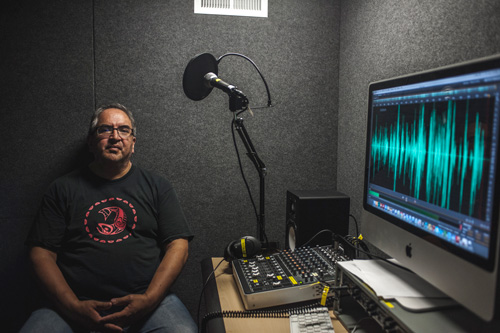 Tobacco Nation is hosted by Wawmeesh Hamilton, award-winning reporter and member of the Hupacasath First Nation in Port Alberni. Photo by Kosta Prodanovic
Tobacco Nation is hosted by Wawmeesh Hamilton, award-winning reporter and member of the Hupacasath First Nation in Port Alberni. Photo by Kosta Prodanovic
To support World No Tobacco Day, the First Nations Health Authority (FNHA) has created and launched the "Tobacco Nation" podcast series. Each episode in the four-part series features candid and moving stories about tobacco. All stories are told by First Nations people living in BC.
"These podcasts are a testament to the power of story," says Tobacco Nation host Wawmeesh Hamilton, an award-winning reporter and member of the Hupacasath First Nation in Port Alberni. "Stories teach us about the world around us and show us the proper way to do things. They give us strength; they can heal. This is what we are exploring in this series."
The podcast series includes cameos from First Nations surgeon and academic Dr. Nadine Caron, University of British Columbia's Dr. Lee Brown, FNHA CEO Joe Gallagher, FNHA Director of Mental Wellness Patricia Vickers, and a number of other First Nations Elders and community members with compelling stories to share.
First Nations individuals in BC are approximately twice as likely to smoke as the general population. Unfortunately this statistic is not all that surprising once you dig deeper and consider factors such as colonialism and intergenerational trauma; when you ask First Nations people about smoking, you'll hear stories about colonialism, stories about family, and stories about triumphing over adversity. Each of the four episodes of Tobacco Nation explores tobacco through a unique lens: cancer, community, tradition and youth.
FNHA CEO Joe Gallagher talks about his own close call with cancer, which came on the heels of his father's death due to cancer. Gallagher shares his story in the hopes of creating a space where we can all begin talking about cancer sooner – before it's too late.
"Testing is extremely important. We need to go for regular screenings to detect problems early on," says Gallagher. "I was fortunate to catch colon cancer at an early stage so a medical intervention actually addressed the situation ... Basically, that procedure saved my life."
Patricia Vickers, Director of Mental Wellness at FNHA, explains how habitual behaviours, such as smoking, are really about escaping an intolerable reality.
"When I went through treatment, those who were beginning to address their childhood abuse and neglect were having a great deal of anxiety. So they were told to go out and smoke," says Vickers. "I have heard it described that these habitual behaviours give us a 'warm hug' when we need it. Our past contributes to our habitual behaviour today."
For thousands of years, natural tobacco has been an integral part of First Nations and Aboriginal cultures – used in ritual, ceremony and prayer. Tobacco Nation also tells the story of Paula Potter. Porter is part of the 'Culture Saves Lives' movement. She leads sweats; she sun dances; she is a traditional pipe carrier. She does this to help Indigenous people reconnect with their cultures. Her sacred use of tobacco, handed down to her by her Indigenous grandmother in Alberta, helped her survive and overcome drug addiction.
"Every morning, I would hold the tobacco and pray to my grandmother … I believe traditional tobacco helped keep me alive," says Potter.
By touching on various aspects of tobacco use via personal stories, Tobacco Nation strives to begin the practice of sharing our personal experiences with tobacco in order to inform, educate and inspire one another.
The Tobacco Nation podcast series is comprised of four 30- to 40-minute episodes. The episodes can be downloaded or streamed at www.fnha.ca/respectingtobacco beginning on May 31, 2017.
Listen to Tobacco Nation via SoundCloud
here.
FNHA SoundCloud RSS link (for podcast players)
Media Contact:
Davis McKenzie
T: 778.823.8276

